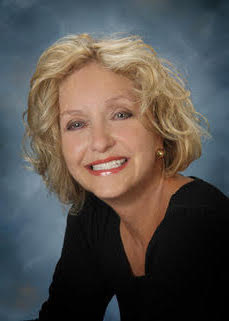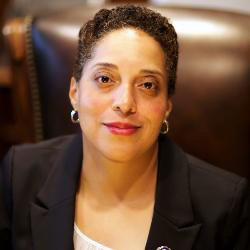The power of decency in the legal profession

Susan Smith Blakely. Photo by Wayne Hill Photography.
There is a fever in America today. This fever is running at a very high pitch, and it has nothing to do with the pandemic.
It is a fever of indecency, and it has infected our institutions, our people and our social discourse. It is changing relationships and stifling progress. It is keeping us from being the best we can be. And it’s infecting the legal profession.
The clinical manifestations of this fever include name-calling, derision, intimidation, bullying, the distortion of truth, an unwillingness to compromise, a lack of caring and a reluctance to serve others.
The legal profession is complicit in the spread of this fever and its underlying infection. That is undeniable to anyone familiar with current legal practices. And the questions are: How did it happen, and what will we do about it?
I have been writing about decency and its importance to the honorable practice of law for almost a decade. Never, however, has that subject seemed more important and relevant to me than it does today.
The social and political upheaval that has been plaguing our country in recent years seems to have exposed the failure of decency and honorable behavior in our society, as it also has within our profession. How this happened at such an accelerated pace is not clear, but it has caused me to consider two possibilities.
Either some lawyers in America have become accustomed to disrespect, indecency and a lack of dignity in our politics and institutions and have allowed it to seep into their professional lives, or the infection of indecency is born of some of those lawyers, themselves, and it has spread from them into our politics and institutions. Honestly, I do not know which is true.
But I do know that, as lawyers, we likely have greater access to the precepts of honorable behavior and concepts of decency and equity than members of the society at large. Isn’t that what the ABA Model Code of Professional Responsibility are all about? Isn’t that what is taught in continuing legal education courses, which are licensure requirements for lawyers?
In 2016, I wrote a piece for Corporate Counsel magazine, which included my observations on our culture of greed, that by then, had infected the law profession. Those comments were made within the context of workaholic lifestyles and the larger issue of work-life balance. However, my warning that greed could bring our profession down, in the same way that the greed of Wall Street and banking institutions led to the 2008 recession, put it into a larger societal context.
Now, four years later—and what seems like a political, professional and social eternity—I still am bothered by the same questions I had then. What, if anything, is to be gained by our profession from participation in a culture of greed that relies upon components of indecency, disrespect and dishonor?
The obvious answers are the lure of profits and law firm ratings that translate into power. And, if that is true, how long will it take before the obsession with money and power will heap destruction on the traditional positive values of our profession?
Lawyers as obstructors of society run amok
There is a reason that Shakespeare wrote, “The first thing we do, let’s kill all the lawyers.” Although this passage from King Henry VI is often cited by those who detest lawyers, the entirety of the work does not support that interpretation.
Rather, it is clear from the context of the play that Shakespeare recognized the law profession as a repository of decency and honor and the front line protector of fair and just behavior—and that its members were the very ones who could bring the bad guys like Shakespeare’s villain Dick the Butcher to justice. Without the lawyers as obstructors, the hordes of humanity could run wild and break down the beloved institutions they had come to resent.
Yet, it seems that far too many lawyers today are willing to give up that perception of standing for good, keeping the peace, facilitating justice and embodying positive values. They have allowed the effects of greed and a misplaced emphasis on power to infect their character and distort the profession in unimagined ways.
One can find examples of lawyers’ indecent behavior on display nearly every day in our national media. Some of these lawyers are in high positions at business organizations, and their crimes include accepting bribes and “cooking the books” to retain money and power. Others are high-ranking government officials, who, as “yes” men and women, have sold out to the dark side, just to be seated at the right hand of power.
And many are in politics serving as elected members of Congress and state legislatures—or their legal consultants and advisers—who are the authors and supporters of misinformation, lies and character assassinations and who ascribe to the theory that winning is all that matters.
Commenting on the political maneuvering related to the recent U.S. presidential election this fall, Germany’s Foreign Minister Heiko Maas addressed the concept of decency, saying, “Decent losers are more important for the function of a democracy than radiant winners.”
But we have seen precious little of that lately. At one time, we believed that state bar associations, bar commissions and practice/ethics committees would weed out the undesirables among us before they were able to wreak havoc on the profession. But we know better today. Adequate policing from within our profession has not happened.
What lawyers can do to seed change
So, in what may be an ironic twist for lawyers, we must think smaller if we are going to protect what is worth protecting. Just like inner-city community activists, we must understand that it is incumbent on us to solve the problem one neighborhood at a time.
We need to start by cleaning our own houses, and we have to say something if we see something. We need to look at the practices and policies within our own law firms and law organizations and ask the fundamental question as to whether those policies and practices promote professional behaviors founded on respect, decency and honor or whether those behaviors are founded on selfishness and greed and cause harm to colleagues and marginalize individuals and cohorts.
It is an easy test. It is basically what our mothers and fathers taught us about right and wrong. The hard part is in eliminating those bad behaviors, even if they derive from highly profitable practices and personal gain, with the awareness that the well-being of lawyers and the elevation of honorable behaviors will sustain us rather than destroy us.
Historian Jon Meacham explored that subject recently in a Town & Country magazine article. “Decency is drawn from the Latin decentia, meaning ‘being fitting,’ a definition that presupposes that there is a widely shared set of values against which we can judge the fittingness of certain behaviors,” Meacham said.
“Put another way, decency has to be sufficiently prevalent that we notice when things … are indecent, for such conduct stands out to us as beyond the norms of acceptable,” he added.
Similarly, Claire Babineaux-Fontenot, CEO of Feeding America, said in the print version of the article (November 2020) that decency is the “seeing of others.” “It requires an acknowledgment of value outside of oneself. It is an expression of humanity,” Babineaux-Fontenot added.
Acting with decency and achieving humanity may seem like lofty goals for lawyers. But, if we assume that the law profession still has the capability to demonstrate decency and lead the way toward a more perfect society, why wouldn’t we?
It is my sincere hope, as a lawyer and also as the mother of two young lawyers, that we will embrace redemption and lead our profession and our society back into the daylight, back to a time when we relished being the leaders of communities, setting unimpeachable examples of honorable behaviors, responding to the needs of others and behaving as admirable human beings. I hope we will return to behaving like the lawyers Shakespeare was counting on.
That would be refreshing and also very wise, according to Lea Berman, co-author of the book Treating People Well. Also quoted in the print version of the Meacham article. Berman said behaving with decency is “smart.” “Life is easier when you’re good to people, because they usually respond in kind,” she said.
“Decency builds friendships and fruitful business connections, and makes life less stressful. Where there’s decency, there’s strength,” Berman added.
It makes a lot of sense to me. Decency is strength and power—just not the destructive kind.
Susan Smith Blakely is a former partner, law career counselor and author of the Best Friends at the Bar book series for female lawyers. Her most recent book is What Millennial Lawyers Want: A Bridge from the Past to the Future of Law Practice.



